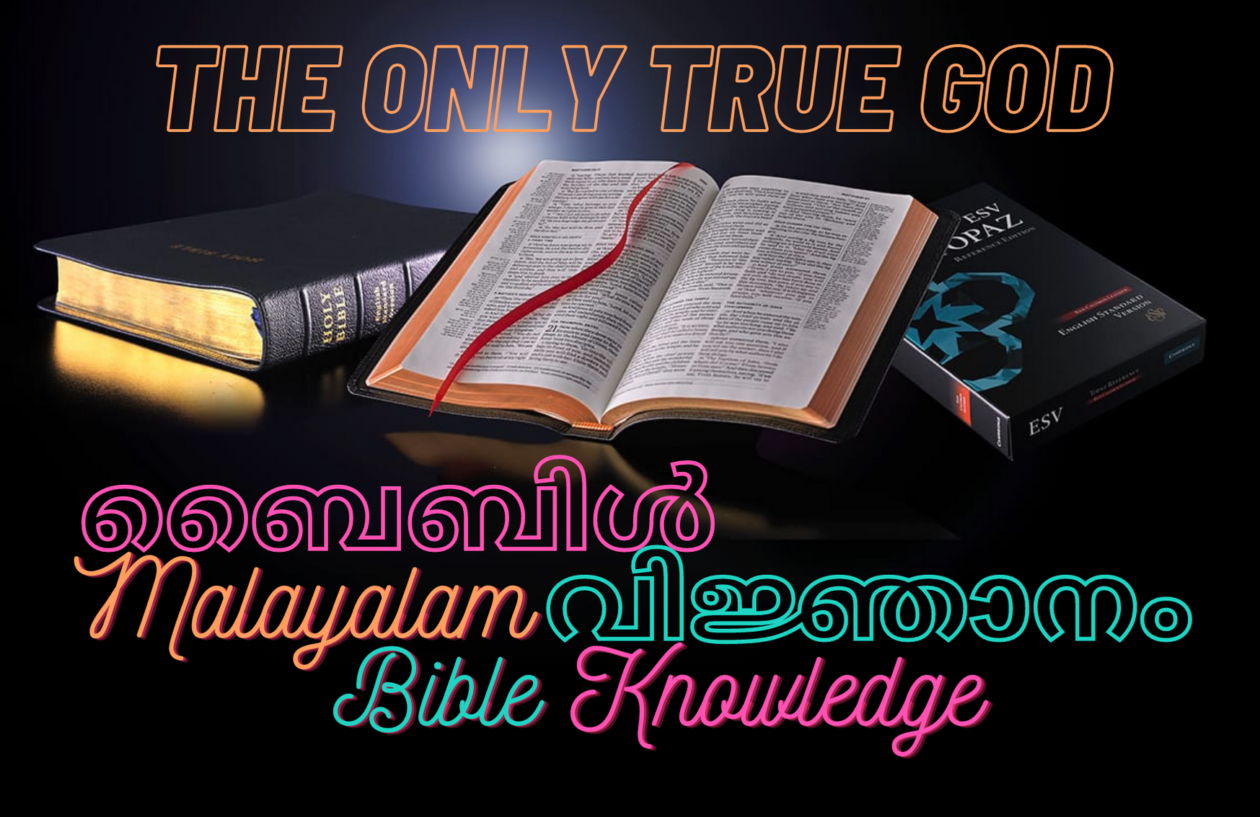ത്രിത്വം, നാലാം നൂറ്റാണ്ടിലെ നവീനോപദേശം
നിഖ്യാകോൺസ്റ്റാൻ്റിനോപ്പിൾ സുന്നഹദോസുകളിലൂടെ സൃഷ്ടിക്കപ്പെട്ട ബൈബിൾവിരുദ്ധ നവീനോപദേശമാണ് ത്രിത്വം. ബൈബിൾ ഭാഷയിൽ പറഞ്ഞാൽ വേറൊരു സുവിശേഷം. (ഗലാ, 1:6,7). ചരിത്രത്തെളിവുകൾ കാണുക:
The New Encyclopaedia Britannica: “Neither the word Trinity, nor the explicit doctrine as such, appears in the New Testament, nor did Jesus and his followers intend to contradict the Shema in the Old Testament: ‘Hear, O Israel: The Lord our God is one Lord’ (Deut. 6:4). . . . The doctrine developed gradually over several centuries and through many controversies. . . . By the end of the 4th century . . . the doctrine of the Trinity took substantially the form it has maintained ever since.”-(1976), Micropaedia, Vol. X, p. 126.
ദി ന്യൂ എൻസൈക്ലോപ്പീഡിയ ബ്രിട്ടാനിക്ക: “ത്രിത്വമെന്ന പദമോ അത്തരത്തിൽ വ്യക്തമായ ഒരു ഉപദേശമോ പുതിയനിയമത്തിൽ കാണപ്പെടുന്നില്ല, യേശുവും അവന്റെ അനുയായികളും: ‘ഇസ്രായേലേ കേൾക്ക: നമ്മുടെ ദൈവമായ കർത്താവ് ഏകകർത്താവ്’ (ആവ. 6:4) എന്ന പഴയനിയമത്തിലെ പ്രസ്താവനയെ എതിർക്കാൻ ഉദ്ദേശിച്ചതുമില്ല. . . . ത്രിത്വോപദേശം സാവകാശം അനേക നൂററാണ്ടുകളിലൂടെയും പല ഭിന്നതകളിലൂടെയുമാണ് വികാസം പ്രാപിച്ചത് . . . നാലാം നൂററാണ്ടിന്റെ അവസാനത്തോടെ ത്രിത്വോപദേശം ഏതാണ്ട് ഇന്നോളം നിലനിന്നുപോന്നിട്ടുളള രൂപം കൈക്കൊണ്ടു.” –(1976), മൈക്രോപ്പീഡിയ, വാല്യം X, പേ. 126.
The New Catholic Encyclopedia: “The formulation ‘one God in three Persons’ was not solidly established, certainly not fully assimilated into Christian life and its profession of faith, prior to the end of the 4th century. But it is precisely this formulation that has first claim to the title the Trinitarian dogma. Among the Apostolic Fathers, there had been nothing even remotely approaching such a mentality or perspective.”-(1967), Vol. XIV, p. 299.
ദി ന്യൂ കാത്തലിക് എൻസൈക്ലോപ്പീഡിയ: ‘മൂന്നാളുകൾ ചേർന്നുളള ഒരു ദൈവം’ എന്ന നിർദ്ദിഷ്ട രൂപം നാലാം നൂററാണ്ടിനു മുമ്പ് ഉറപ്പായി സ്ഥാപിക്കപ്പെട്ടിരുന്നില്ല, തീർച്ചയായും ക്രിസ്തീയ ജീവിതത്തിലേക്കോ അതിന്റെ വിശ്വാസ പ്രമാണത്തിലേക്കോ സ്വീകരിക്കപ്പെട്ടിരുന്നില്ല. എന്നിരുന്നാലും ത്രിത്വ വിശ്വാസത്തിൽ ഒന്നാം സ്ഥാനത്ത് നിൽക്കുന്നത് കൃത്യമായും ഈ നിർദ്ദിഷ്ട രൂപം തന്നെയാണ്. അപ്പോസ്തലിക പിതാക്കൻമാർക്കിടയിൽ അത്തരമൊരു മനോഭാവത്തോടൊ കാഴ്ചപ്പാടോടൊ വിദൂരത്തിലെങ്കിലും അടുത്തുവരുന്ന യാതൊന്നുമില്ലായിരുന്നു.”-(1967), വാല്യം XIV, പേ. 299.
The Encyclopedia Americana: “Christianity derived from Judaism and Judaism was strictly Unitarian [believing that God is one person]. The road which led from Jerusalem to Nicea was scarcely a straight one. Fourth century Trinitarianism did not reflect accurately early Christian teaching regarding the nature of God; it was, on the contrary, a deviation from this teaching.”-(1956), Vol. XXVII, p. 294L.
ദി എൻസൈക്ലോപ്പീഡിയ അമേരിക്കാനാ: “ക്രിസ്ത്യാനിത്വം യഹൂദമതത്തിൽനിന്ന് വന്നിട്ടുളളതാണ്, യഹൂദമതമാകട്ടെ വളരെ കർശനമായി ഏകദൈവത്തിൽ [ദൈവം ഒരാൾ മാത്രമാണെന്ന്] വിശ്വസിച്ചിരുന്നു. യെരൂശലേമിൽ നിന്ന് നിഖ്യായിലേക്ക് നയിച്ച വഴി യാതൊരു പ്രകാരത്തിലും നേരായ ഒന്നായിരുന്നില്ല. നാലാം നൂററാണ്ടിലെ ത്രിത്വവാദം ദൈവത്തിന്റെ സ്വഭാവം സംബന്ധിച്ച ആദിമ ക്രിസ്ത്യാനികളുടെ പഠിപ്പിക്കലിനെ കൃത്യമായി പ്രതിഫലിപ്പിച്ചില്ല; മറിച്ച് അത് ഈ പഠിപ്പക്കലിൽ നിന്നുളള ഒരു വ്യതിചലനമായിരുന്നു.”-(1956), വാല്യം XXVII, പേ. 294L.
Nouveau Dictionnaire Universel: “The Platonic trinity, itself merely a rearrangement of older trinities dating back to earlier peoples, appears to be the rational philosophic trinity of attributes that gave birth to the three hypostases or divine persons taught by the Christian churches. . . . This Greek philosopher’s [Plato, fourth century B.C.E.] conception of the divine trinity . . . can be found in all the ancient [pagan] religions.”-(Paris, 1865-1870), edited by M. Lachâtre, Vol. 2, p. 1467.
നോവേ ഡിക്ഷെനെയർ യൂണിവേഴ്സൽ: “ക്രിസ്തീയസഭകൾ പഠിപ്പിക്കുന്ന മൂന്നു ദിവ്യവ്യക്തികളടങ്ങിയ ത്രിത്വവിശ്വാസത്തിന് ജൻമം നൽകിയ ത്രിത്വഗുണങ്ങളുടെ തത്വജ്ഞാനപരമായ അടിസ്ഥാനം നൽകിയത് പ്ലേറേറാണിക ത്രിത്വവിശ്വാസമാണെന്ന് കാണാം, അതുതന്നെയും പുരാതന ജനതകളുടെ നേരത്തെയുളള ത്രിത്വങ്ങളുടെ പുനർക്രമീകരണം മാത്രമായിരുന്നു. . . . ദിവ്യത്രിത്വം സംബന്ധിച്ച ഈ ഗ്രീക്ക് തത്വചിന്തകന്റെ [പ്ലേറേറാ ബി.സി. 4-ാം നൂററാണ്ട്] ആശയം എല്ലാ പുരാതന [പുറജാതി] മതങ്ങളിലും കാണാൻ കഴിയും.”-(പാരീസ്, 1865-1870) എം. ലക്കാട്രേ എഡിററ് ചെയ്തത്, വാല്യം 2, പേ. 1467.
John L. McKenzie, S.J., Dictionary of the Bible: “The trinity of persons within the unity of nature is defined in terms of ‘person’ and ‘nature’ which are G[ree]k philosophical terms; actually the terms do not appear in the Bible. The trinitarian definitions arose as the result of long controversies in which these terms and others such as ‘essence’ and ‘substance’ were erroneously applied to God by some theologians.”-(New York, 1965), p. 899.
ജോൺ എൽ. മക്കൻസി, എസ്സ്. ജെ. ഡിക്ഷനറി ഓഫ് ദി ബൈബിൾ: “ഏക സ്വഭാവത്തിലുളള മൂന്നാളുകൾ എന്ന ആശയം ‘വ്യക്തി’ ‘സ്വഭാവം’ എന്ന പദങ്ങളുപയോഗിച്ചാണ് നിർവ്വചിക്കപ്പെട്ടിരിക്കുന്നത്, അവയാകട്ടെ ഗ്രീക്ക് തത്വജ്ഞാനത്തിൽനിന്നും എടുത്തിട്ടുളള പദങ്ങളാണ്; വാസ്തവത്തിൽ അവ ബൈബിളിൽ കാണപ്പെടുന്നില്ല. ചില ദൈവശാസ്ത്രജ്ഞൻമാർ ഈ പദങ്ങളും ‘സാരാംശം’ ‘തത്വം’ എന്നിങ്ങനെയുളള മററു പല പദങ്ങളും തെററായി ദൈവത്തിനു ബാധകമാക്കിക്കൊണ്ട് ദീർഘകാലം വാഗ്വാദങ്ങൾ നടത്തിയതിന്റെ ഫലമായിട്ടാണ് ത്രിത്വത്തിനുളള നിർവ്വചനം ഉരുത്തിരിഞ്ഞു വന്നത്.”-(ന്യൂയോർക്ക്, 1965), പേ. 899.
The Oxford Companion to the Bible (Metzger and Coogan), pages 782-3: “Because the Trinity is such an important part of later Christian doctrine, it is striking that the term does not appear in the New Testament. Likewise, the developed concept of three coequal partnersin the Godhead found in later creedal formulations cannot be clearly detected within the confines of the [Bible] canon. … It is important to avoid reading the Trinity into places where it does not appear.”
ദി ഓക്സ്ഫോർഡ് കമ്പാനിയൻ ടു ദ ബൈബിളിൽ (മെറ്റ്സ്ജറും കൂഗനും), പേജുകൾ 782-3: “ത്രിത്വം പിൽക്കാല ക്രിസ്ത്യൻ സിദ്ധാന്തത്തിന്റെ വളരെ പ്രധാനപ്പെട്ട ഭാഗമായതിനാൽ, പുതിയ നിയമത്തിൽ ഈ പദം പ്രത്യക്ഷപ്പെടുന്നില്ല എന്നത് ശ്രദ്ധേയമാണ്. അതുപോലെ, പിൽക്കാല വിശ്വാസ രൂപീകരണങ്ങളിൽ കണ്ടെത്തിയ ദൈവത്വത്തിൽ മൂന്ന് തുല്യ പങ്കാളികൾ എന്ന വികസിത ആശയം വ്യക്തമായി കണ്ടെത്താൻ കഴിയില്ല. [ബൈബിൾ] കാനോനിന്റെ പരിധികൾ. … ത്രിത്വം പ്രത്യക്ഷപ്പെടാത്ത സ്ഥലങ്ങളിൽ വായിക്കുന്നത് ഒഴിവാക്കേണ്ടത് പ്രധാനമാണ്.”
“ക്രിസ്തുവിന്റെ കൃപയാൽ നിങ്ങളെ വിളിച്ചവനെ വിട്ടു നിങ്ങൾ ഇത്രവേഗത്തിൽ വേറൊരു സുവിശേഷത്തിലേക്കു മറിയുന്നതു കൊണ്ടു ഞാൻ ആശ്ചര്യപ്പെടുന്നു. അതു വേറൊരു സുവിശേഷം എന്നല്ല, ചിലർ നിങ്ങളെ കലക്കി ക്രിസ്തുവിന്റെ സുവിശേഷം മറിച്ചുകളവാൻ ഇച്ഛിക്കുന്നു എന്നത്രേ.” (ഗലാത്യർ 1:6,7)
